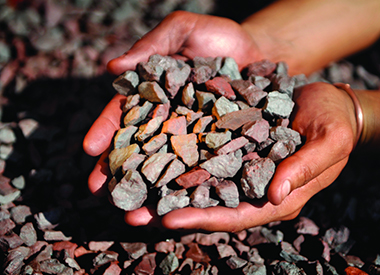Copper's extensive and versatile role in medicine, from ancient civilisations to modern healthcare systems, highlights its critical importance in global health. From its antimicrobial properties to its role within advanced medical devices, copper is indispensable in ensuring safer, more effective medical practices.
Did you know?
Copper has been used by human civilisations for thousands of years to sterilise wounds and drinking water. Revered for its antimicrobial properties and malleability, copper became a staple in many early societies.
Copper’s use in traditional medicine remains strong to this day. In Ayurvedic medicine, practised in India for over 5,000 years, copper vessels are used to store water which are known for its sterilisation properties, among introducing other health benefits by releasing low-concentrate ions. Similarly, in Traditional Chinese Medicine (TCM), copper tools and ointments have long been used as a form of pain-relief.
In more recent years, copper has been incorporated into clinical environments to fight against antimicrobial resistance, resulting in far fewer microbes, with research being conducted across multiple countries, ranging from the United Kingdom, South Africa and Chile, showing similar results - demonstrating the global reach of copper’s health properties.
Copper in medicine, medical equipment and devices
In response to the COVID-19 pandemic, there has been a surge in research on copper’s antiviral properties. Studies have shown that copper can inactivate coronaviruses within minutes of contact. Copper-infused textiles, face masks, and air filtration systems are being developed to reduce viral transmission in healthcare and public spaces, showcasing copper’s growing importance in global health security.
Copper’s excellent electrical conductivity makes it indispensable in the manufacturing of medical equipment, especially those involving electrical components. Copper is critical to the functioning of MRI machines, surgical lasers, pacemakers, and defibrillators – devices that rely on precise electrical signals. For instance, MRI scanners, introduced in the late 1970s, use copper wire for their superconducting magnets, which allows them to generate the strong magnetic fields necessary for imaging.
Furthermore, copper is increasingly being used in medical implants and prosthetics. Its biocompatibility makes it suitable for use in hip replacements, dental implants, and vascular stents. Copper’s antimicrobial properties also reduce the risk of post-surgical infections in these devices. One example is copper-containing joint prostheses, which have been shown to decrease infection rates by up to 50%, offering a safer solution for patients undergoing these procedures.
In reproductive health, copper has played a significant role since the 1960s with the development of the copper intrauterine device (IUD). The copper IUD is a hormone-free contraceptive that has been used by millions of women worldwide. Copper ions released by the device create a hostile environment for sperm, preventing fertilisation. This method remains one of the most effective and long-lasting forms of contraception, with some devices providing up to 10 years of protection.
Copper’s future in medicine
The future of copper in medicine looks promising, with numerous areas of research and development underway. Biodegradable medical devices made from copper are gaining traction, offering solutions such as temporary stents that dissolve within the body after fulfilling their purpose, eliminating the need for additional surgeries.
Copper’s role in medical implants, wound healing, and antimicrobial technologies is likely to expand as the global population ages and healthcare demands increase. As new medical technologies emerge, copper’s unique properties will continue to be integral.
Anglo American’s commitment to providing high-quality, ethically sourced copper ensures that the medical industry can continue to innovate and grow while minimising its environmental impact.



